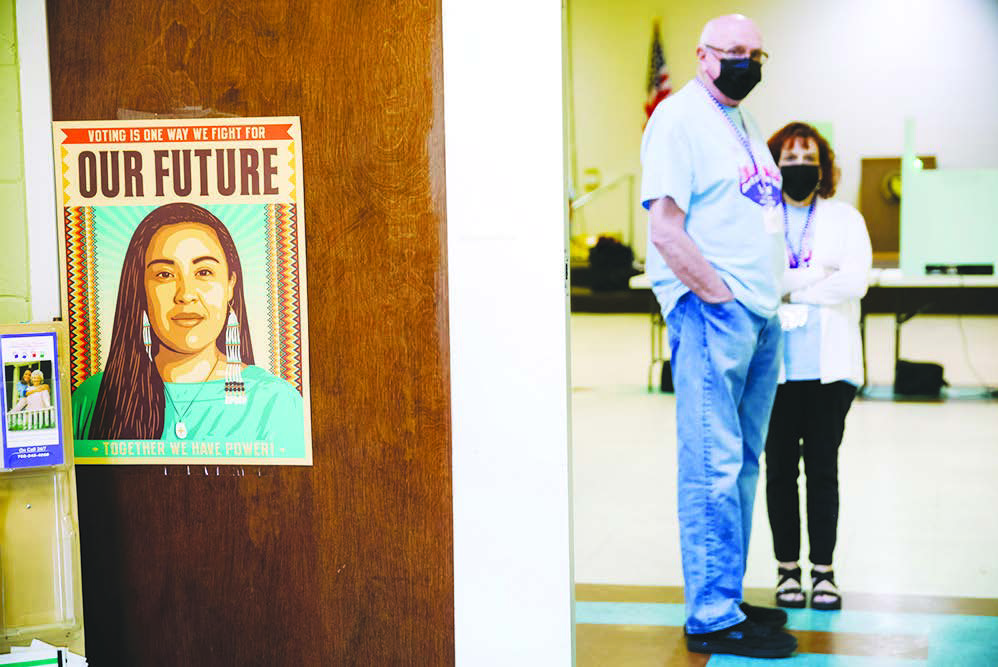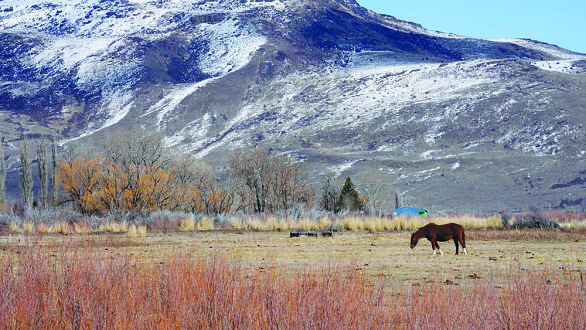
Clark County Election Board Officers waitfor voters June 14, 2022, primary Election Day, at the Moapa-Paiute CommunityCenter on the MoapaRiver IndianReservation. For November’s presidential election, Indigenous communities’ advocacy has led to updates for Nevada’s 28 federally recognized tribes, including the ability to cast ballots through an online system and utilize new polling sites and drop boxes entirely on their land.

RICK BOWMER / ASSOCIATED PRESS
When Arnold Thomas was attending college at the University of Utah, going to vote required walking a few blocks in Salt Lake City to a polling place. But back home at the Duck Valley Indian Reservation on the Nevada-Idaho border, the nearest polling center was a few hours drive along a two-lane highway that’s often snowy this time of year.
“Some (tribe members) would (vote by) mail-in ballot and others would come up to Elko. They mentioned that’s a good hour and a half away,” said Thomas, who is now in his mid-50s. “Some of the relatives here said, ‘Well that’s just not worth it to vote.’” Then in 2022, Thomas’ tribes, the Shoshone-Paiute, took Elko County to court.
And the tribes won, establishing the first voting center in Nevada on the tribes’ reservation. The result is more and easier access to voting for the more than 500 registered voters on the Nevada side of the reservation.
Roadblocks have limited ballot access for Native Americans for centuries, but actions like the Shoshone-Paiute’s law suit have expanded their voting rights.
For November’s presidential election, Indigenous communities’ advocacy has led to updates for Nevada’s 28 federally recognized tribes, including the ability to cast ballots through an online system and utilize new polling sites and drop boxes entirely on their land.
For the first time, tribal members living on reservations can use the Effective Absentee System for Elections (EASE) system, which allows voters to register, request, mark and return ballots through an online application they can access from home. EASE ballots can also be cast by voters with disabilities, service members and their families, and citizens outside the country.
Mathilda Miller was one of the advocates pushing for expanding EASE to tribal communities through her organization, Native Voters Alliance Nevada. Miller, the group’s government relations director, listed EASE access as an example of how “Nevada is leading the gold standard of what voting rights should look like across the country.” Nevada Secretary of State Cisco Aguilar said watching tribal communities react to EASE access has been emotional.
He added that he hoped for larger turnout than usual among voters on reservations because of the updates to the voting process. “You learn these things as you go through this process, and as tribal communities start to trust you, they start raising these issues that they want to see addressed.” Aguilar said. The secretary of state’s office also has a tribal liaison who works from the Carson City office and highlights communities’ needs to be addressed.
“What I think is very beautiful about our current makeup and how fantastic all of our county clerks and registrars a reis that they are very willing and able to listen to a lot of the concerns that we may have, especially with the secretary of state’s office,” Miller said. While the EASE expansion is part of the “very big and beautiful victories to be very proud of” for voting rights, Miller added that it wasn’t a Band-Aid solution and that there continues to be work to bed one.
“We had a very long history where they had, not the best relationships or the best perspective of the United States and voting,” Miller said about Indigenous communities. “And a lot of them tend to believe, ‘Why does voting even matter? It’s not our way of life.’”
The work her organization does to foster civic engagement with Indigenous populations, Miller added, includes ensuring members feel they have a permanent seat at the table.
Native Voters Alliance of Nevada seeks to accomplish this through events like “baby goats and votes,” where attendees cuddle goats while learning about the same day voter registration process. “I can tell someone all the election laws, but it’s not as fun and it’s not as entertaining and it just feels very transactional,” Miller said.
“And it’s going to continue making people feel incredibly afraid and incredibly uninterested in the process.” While EASE has created a lot of excitement among communities, it also touches on some barriers that need to be addressed, like sufficient internet capabilities. “In a lot of tribes, and especially in a lot of rural areas, they may not have the most reliable infrastructure or good quality broad band access,” Miller said.
Thomas echoed Miller’s sentiments on how internet access isn’t always reliable on the reservation, and how that could be a potential pit fall of EASE.
The Duck Valley Reservation spans the Idaho and Nevada border, and trouble with online connectivity is just one way proximity to the state border creates unique issues for the Shoshone-Paiute to address.
Fiber is laid on the Idaho portion of the reservation, and Nevada is still working on adding it on its side of Duck Valley, which Thomas said would bolster more effective connectivity. “Some people say, ‘Oh yeah, Duck Valley is in the state of Idaho and it’s in the state of Nevada,’” Thomas said. “Before there was an Idaho or Nevada state, this was our ancestrall and.
” Thomas learned the power of his voice in the late 1980s— when he lost his. He survived a suicide attempt, and as a result, permanently lost his vision and temporarily was unable to speak. “Over the years, I’ve been able to relearn how to speak, therefore understanding the importance of having a voice,” Thomas said. “And how to use that voice for my people, for those that are disabled, for those that are considered in poverty or they’re home lessor incarcerated.”
He said that as he learned how to mobilize in society as a person with new needs, he became especially attentive to the needs of others, like requiring easier access to vote. “I know that we have a good number of eligible voters here, that we can make a difference,” Thomas said. “And we do have a say in the state and people are understanding that our vote does count in Nevada, being a swing state.” haajrah.gilani@gmgvegas. com/702-990-8923 / @haajrahgilani

